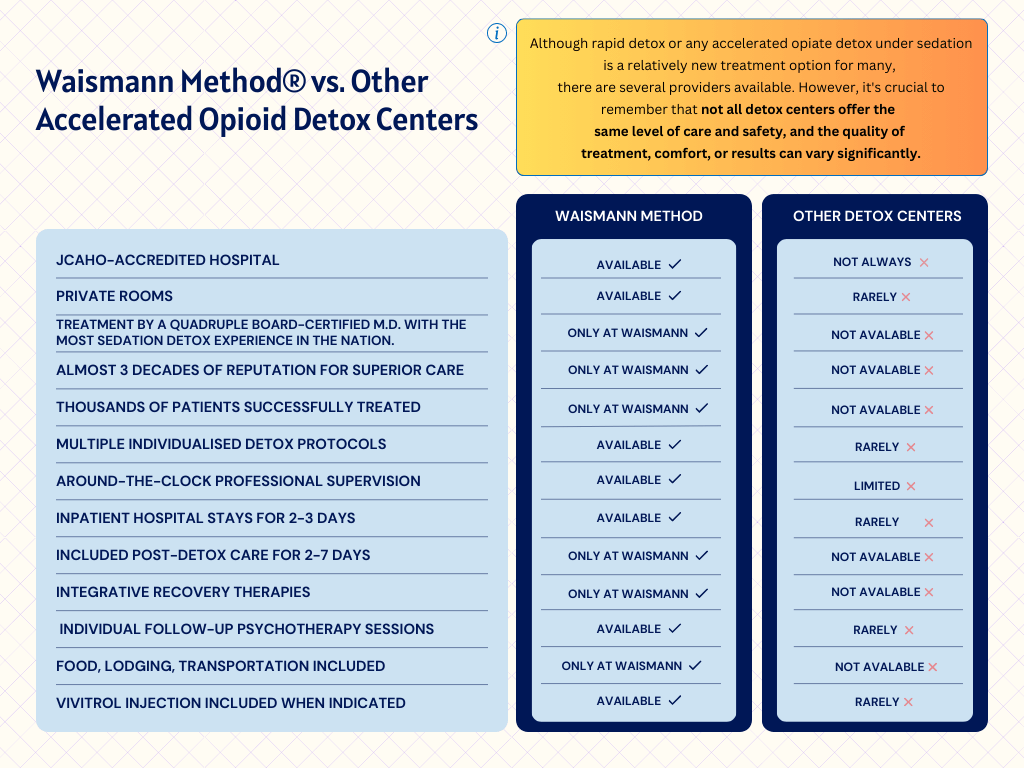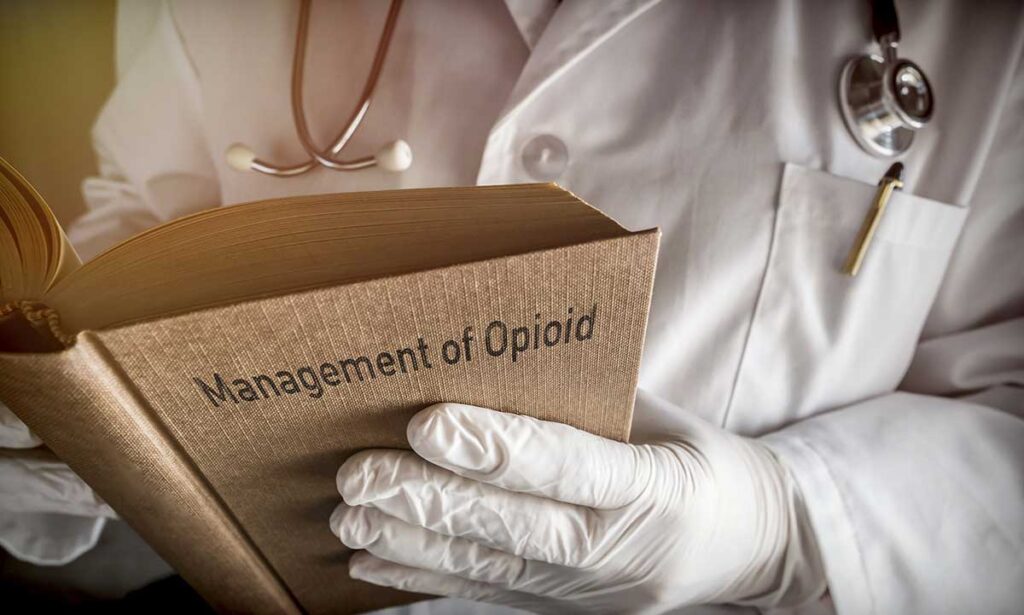When exploring options for opioid detoxification, understanding rapid detox cost is essential. As of now, Waismann Method does not provide direct treatment. Instead, we focus on education, awareness, and training to help patients and families make informed decisions about opioid detox. With nearly three decades of leadership in the field, our insights remain a trusted resource for those navigating the complexities of rapid detox and related services.
What Is Rapid Detox?
Rapid detox, also known as sedation-assisted opioid detox, is a medical procedure in which opioid receptors are cleansed while the patient is under sedation. The goal is to accelerate the acute withdrawal phase, reducing the intensity and duration of symptoms. While this method can offer a significantly faster path to being opioid-free, it must be approached with the highest standards of safety and medical oversight.
Understanding what rapid detox costs should involve more than a number. It requires evaluating what services are included, who is providing the care, and where the procedure takes place.
Rapid Detox Cost: A Breakdown of Factors
The cost of rapid detox can range significantly typically between $10,000 and $30,000—depending on:
- Type of facility (accredited hospital vs. non-accredited or surgical center)
- Duration of inpatient stay (before and after detox)
- Complexity of the individual’s health and drug use history
- Medical staff qualifications and access to specialists
- Level of post-detox care and support services
When evaluating these costs, it is critical to understand what each program includes and what may be omitted. Unfortunately, not all high-cost accelerated opioid detox programs offer the high level of care you deserve. Some programs, despite charging premium rates, provide only one night of inpatient care and expect patients to pay extra for every additional service, even those directly related to detox and essential for safety. This practice can leave individuals medically vulnerable and financially strained.
The Importance of Inpatient Pre- and Post-Detox Care
A legitimate, medically responsible rapid detox protocol should always include a full inpatient day prior to detox and several days afterward. Here’s why:
Pre-Detox Inpatient Care
- Stabilization: Long-term opioid use often leads to cardiovascular, metabolic, and neurochemical instability. Stabilizing the patient before detox is essential to reduce the risks associated with sedation.
- Medical screening: Assessing organ function, vital signs, and identifying hidden medical issues is vital for customizing a safe detox plan.
- Pre-medication and hydration: These reduce stress on the body during withdrawal and support neurochemical balance.
Post-Detox Inpatient Care
- Neuroregulation: After detox, the nervous system needs time to recalibrate. Without proper care, patients may experience severe anxiety, hypersensitivity, or insomnia.
- Autonomic function monitoring: Blood pressure, heart rate, and temperature regulation can fluctuate, requiring continued supervision.
- Physical and emotional stabilization: The post-detox phase is when patients are most vulnerable to relapse. Professional support can make a critical difference.
The Importance of Inpatient Pre- and Post-Detox Care
A legitimate, medically responsible rapid detox protocol should always include a full inpatient day prior to detox and several days afterward. Here’s why:
Pre-Detox Inpatient Care
- Stabilization: Long-term opioid use often leads to cardiovascular, metabolic, and neurochemical instability. Stabilizing the patient before detox is essential to reduce the risks associated with sedation.
- Medical screening: Assessing organ function, vital signs, and identifying hidden medical issues is vital for customizing a safe detox plan.
- Pre-medication and hydration: These reduce stress on the body during withdrawal and support neurochemical balance.
Post-Detox Inpatient Care
- Neuroregulation: After detox, the nervous system needs time to recalibrate. Without proper care, patients may experience severe anxiety, hypersensitivity, or insomnia.
- Autonomic function monitoring: Blood pressure, heart rate, and temperature regulation can fluctuate, requiring continued supervision.
- Physical and emotional stabilization: The post-detox phase is when patients are most vulnerable to relapse. Professional support can make a critical difference.
Facility Type Matters: Hospital vs. Surgical Center
Accredited Hospitals
- Full-service medical teams and emergency support
- Access to specialists like cardiologists, neurologists, and anesthesiologists
- Meets JCAHO (Joint Commission) standards for patient safety
- Best suited for high-risk or complex detox cases
Non-Accredited Facilities or Surgical Centers
- Limited resources and staff
- Often perform detox in one day without pre-screening
- No ICU or inpatient capacity for emergencies
- Greater risk of complications and incomplete detox
When considering rapid detox cost, ensure the facility meets the highest safety benchmarks. Lower prices at outpatient or surgical centers may come at the cost of quality and security.
Understanding the Difference: Accredited Hospitals vs. Non-Accredited Facilities and Surgical Centers
1. Accredited Hospital (e.g., JCAHO-Accredited)
-
Definition: A full-service medical facility evaluated and approved by The Joint Commission or similar nationally recognized organizations.
-
Key Features:
-
Meets rigorous safety, quality, and patient care standards.
-
Full range of specialists (cardiologists, anesthesiologists, neurologists, etc.).
-
ICU availability and emergency support on-site.
-
Ideal for complex medical procedures like rapid detox under sedation.
-
-
Why It Matters: Accreditation ensures that strict protocols are followed—vital when sedating patients withdrawing from potent opioids.
2. Non-Accredited Hospital
-
Definition: A facility that may call itself a “hospital” but has not met or maintained standards set by accrediting bodies.
-
Key Features:
-
May lack access to full medical departments or specialists.
-
Often limited in equipment, staff training, and emergency preparedness.
-
Regulatory oversight is often minimal or inconsistent.
-
-
Why It Matters: Without accreditation, there’s no formal assurance of patient safety or care quality. Risk increases significantly for complications during detox.
3. Surgical Center / Outpatient Facility
-
Definition: A clinic or office-based setting where outpatient procedures are performed, often under local or general anesthesia.
-
Key Features:
-
Not equipped for prolonged medical stays or emergency care.
-
Typically used for minor surgeries or cosmetic procedures.
-
Lacks overnight monitoring or multidisciplinary care.
-
-
Why It Matters: Surgical centers are not designed for detox from opioids, which involves multiple body systems, potential withdrawal complications, and the need for continuous monitoring.
What to Ask When Comparing Rapid Detox Costs
When contacting providers or researching online, use these questions to guide your decision:
- Is the procedure performed in an accredited, full-service hospital?
- How many days of inpatient care are included before and after detox?
- What is the medical team’s experience with sedation-assisted detox?
- Is the cost all-inclusive, or are there additional charges for labs, consultations, or medications?
- What kind of post-detox emotional or physiological support is offered?
Rapid Detox Cost vs. Long-Term Value
A low-cost rapid detox may appear appealing at first glance, but skipping medical evaluations or shortening aftercare can result in:
- Incomplete detox
- Increased chance of medical complications
- Higher risk of relapse due to unmanaged post-acute withdrawal
In contrast, programs that include comprehensive inpatient care may offer a higher initial cost but deliver greater safety, effectiveness, and long-term results.
Waismann Method: A Trusted Name in Rapid Detox Awareness
Although Waismann Method is no longer offering treatment services, we continue to provide:
- Educational content on opioid dependence and treatment options
- Awareness of safe, effective detox protocols
- Training and support materials for healthcare providers and institutions
Our commitment to patient safety and scientific integrity remains unchanged. We invite you to explore our website and learn from decades of leadership in accelerated opioid detox education.
Conclusion: Know the True Rapid Detox Cost
Understanding rapid detox cost means more than comparing price tags. It means understanding what’s medically necessary, what services are included, and what safety measures are in place. We hope this educational guide helps you or your loved one make the most informed and safest choice possible.
Sources:
SAMHSA National Helpline & Treatment Locator
A confidential, 24/7 helpline offering support and referrals for substance use treatment, including medical detox.
https://www.samhsa.gov/find-help/national-helpline
TIP 45: Detoxification and Substance Abuse Treatment (SAMHSA)
Comprehensive clinical guidelines for detoxification, including safety protocols and aftercare recommendations.
https://store.samhsa.gov/sites/default/files/d7/priv/sma15-4131.pdf
CDC: Understanding Substance Use Disorders
Educational overview of substance use disorders, treatment options, and the importance of safe detoxification.
https://www.cdc.gov/drugoverdose/prevention/index.html
NIH: Principles of Drug Addiction Treatment
Evidence-based principles and approaches for effective addiction treatment, including detoxification.
https://nida.nih.gov/publications/principles-drug-addiction-treatment-research-based-guide-third-edition
JAMA: Adverse Events in Anesthesia-Assisted Rapid Detox
Peer-reviewed research on the risks and safety considerations of rapid detox procedures.
https://jamanetwork.com/journals/jama/fullarticle/194080
NSW Health: Rapid Opioid Detoxification Guidelines
Official clinical guidelines for rapid opioid detoxification, emphasizing patient safety and monitoring.
https://www1.health.nsw.gov.au/pds/ActivePDSDocuments/GL2018_024.pdf
To explore more, visit www.opiates.com and discover how education can empower recovery.
The website www.rapiddetox.com may include advertisements or information about products and promotions offered by third parties. You may purchase products from or participate in promotions of third parties whose promotions or products are on RapidDetox.com. Additionally, any such correspondence or promotions, including the delivery of and the payment for goods and services by those third parties, and any other terms, conditions, warranties, or representations associated in addition to that, are solely between you and the third party. We assume no liability, obligation, or responsibility for any part of any such purchase, agreement, or promotion.









